1 janv. 201 av. J.-C. - Second Punic War Ends
Description:
Carthage lost Hispania forever, and Rome firmly established her power there over large areas. Rome imposed a war indemnity of 10,000 silver talents (300 tonnes/660,000 pounds), limited the Carthaginian navy to 10 ships (to ward off pirates), and forbade Carthage from raising an army without Roman permission. The Numidians took the opportunity to capture and plunder Carthaginian territory. Half a century later, when Carthage raised an army to defend itself from these incursions, Rome destroyed her in the Third Punic War (149–146 BC). Rome, on the other hand, by her victory, had taken a key step towards what ultimately became her domination of the Mediterranean world.The end of the war did not meet with a universal welcome in Rome. When the Senate decided upon a peace treaty with Carthage, Quintus Caecilius Metellus, a former consul, said he did not look upon the termination of the war as a blessing to Rome, since he feared that the Roman people would now sink back again into its former slumbers, from which it had been roused by the presence of Hannibal.[74] Others, most notably Cato the Elder, feared that if Carthage was not completely destroyed it would soon regain its power and pose new threats to Rome; he pressed for harsher peace conditions. Even after the peace, Cato insisted on the destruction of Carthage, ending all his speeches with "Carthage must be destroyed", even if they had nothing to do with Carthage.
Archaeology has discovered that the famous circular military harbour at Carthage, the Cothon, received a significant buildup during or after this war. Though shielded from external sight, it could house and quickly deploy about 200 triremes. This appears a surprising development as, after the war, one of the terms of surrender restricted the Carthaginian fleet to only ten triremes. One possible explanation: as has been pointed out for other Phoenician cities, privateers with warships played a significant role besides trade, even when the Roman Empire was fully established and officially controlled all coasts. In this case it is not clear whether the treaty included private warships. The only reference to Carthaginian privateers comes from the First Punic War: one such privateer, Hanno the Rhodian, owned a quinquereme (faster than the serial production models that the Romans had copied), manned with about 500 men and then among the heaviest warships in use. Later pirates in Roman waters are all reported with much smaller vessels, which could outrun naval vessels, but operated with lower personnel costs. Thus piracy was probably highly developed in Carthage and the state did not have a monopoly of military forces. Pirates probably played an important role in capturing slaves, one of the most profitable trade-goods, but merchant ships with tradeable goods and a crew were also their targets. No surviving source reports the fate of Carthaginian privateers in the periods between and after the Punic Wars.
Hannibal became a businessman for several years and later enjoyed a leadership role in Carthage. However, the Carthaginian nobility, upset by his policy of democratisation and his struggle against corruption, persuaded the Romans to force him into exile in Asia Minor, where he again led armies against the Romans and their allies on the battlefield. He eventually committed suicide (c. 182 BC) to avoid capture.
Constant low-level warfare persisted between Carthage and Numidia, but, by the time of the Third Punic War (149–146 BC), Carthage had lost most of its African territories and the Numidians traded independently with the Greeks.
Ajouté au bande de temps:
Date:
1 janv. 201 av. J.-C.
Maintenaint
~ Il y a 2228 ans
